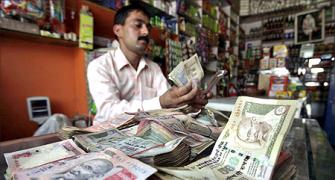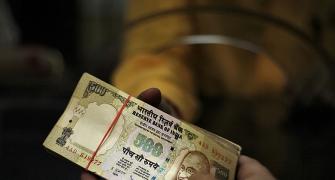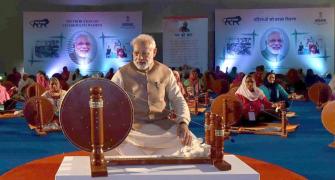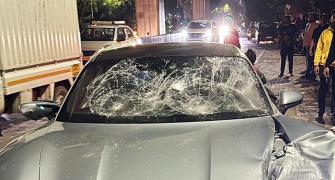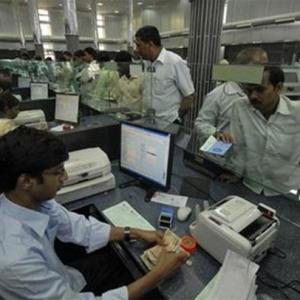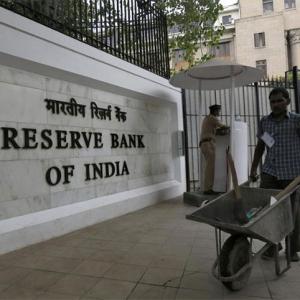Finance Minister Arun Jaitley witll spearhead the campaign with BJP President Amit Shah as its chief strategist, reports Archis Mohan.
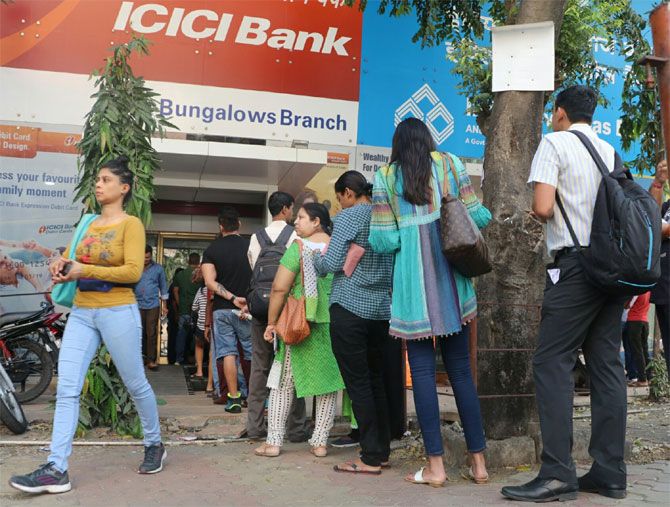 Concerned at a 'sustained campaign' by political rivals to discredit the demonetisation of Rs 500 and Rs 1,000 notes, the Narendra Modi government and the Bharatiya Janata Party have launched a multi-pronged outreach.
Concerned at a 'sustained campaign' by political rivals to discredit the demonetisation of Rs 500 and Rs 1,000 notes, the Narendra Modi government and the Bharatiya Janata Party have launched a multi-pronged outreach.
The spearhead of the campaign is Finance Minister Arun Jaitley and BJP President Amit Shah is the chief strategist.
The government has decided not to rely for this outreach on the government machinery, but on the BJP and Rashtriya Swayamsevak Sangh cadres on the ground and on social media.
Added to this is the BJP's sharply defined political onslaught, founded on the binary of nationalists versus anti-nationals, on its rivals for criticising the scheme.
On Friday, November 11, Shah asked those slamming the move -- the Congress, the Bahujan Samaj Party, the Samajwadi Party, the Trinamool Congress and the Aam Aadmi Party -- why they were batting for anti-national elements whom the move had hurt -- terrorists, drug smugglers, hawala operators, and Maoists.
According to sources, Shah has personally listed 80 news television channels, including English and regional language channels, to which Jaitley will give interviews in the days to come.
The BJP has already issued orders to put up over 1,000 informative hoardings, with the PM's photograph, about demonetisation and its benefits.
These will initially come up in bigger urban centres.
Sources in the Press Information Bureau, the Union government's department responsible for spreading the message of government programmes and policies, admitted that the secrecy around the PM's announcement had also meant that no plan was in place to reach out to the public. This has led to a lack of ownership among government departments to propagate the move.
The BJP president has stepped forward to plug this gap.
BJP and RSS cadres across the country, particularly in poll-bound Uttar Pradesh, have been asked to convince people that they should help in making the Modi government's decision a success in the national interest.
Shah made it evident that the Modi government's 'surgical strike' on 'black money' will be his party's poll plank in the forthcoming assembly polls in five states. He claimed that as many as 20 million people were issued new notes on Thursday, November 10.
At Shastri Bhavan, which houses several ministries, there were long queues outside the ATMs inside the premises. The queues stretched till the entry/exit gates.
Visibly nervous ministers were seen dashing from the gates to their cars, lest they found themselves in the midst of an angry group of people.
Senior ministers and party leaders are biting their nails, hoping that the next few days bring a semblance of order to the chaos and pass off without any untoward incident which might alter the positive discourse generated by the government move.
Demonetisation damage greater than its benefits, says Kaushik Basu On day-2 of the demonetization drive, serpentine queues have reported from banks and ATMs around the country
Demonetisation unlikely to lead to windfall for govt: Experts
Anup Roy reports from Mumbai:
Many, including some in the government, are saying that the withdrawal of high value currency notes will lead to a windfall to the Centre through dividends earned from the Reserve Bank of India, but people familiar with RBI balance sheet say that is unlikely the case.
What the withdrawal of the currency notes would ensure is complete elimination of fake high value currency notes and getting some grip on the black money situation. For that, the government, the Reserve Bank and banks will have to incur necessary cost, without expecting any other monetary gain.
Chief Economic Advisor Arvind Subramanian, who once suggested that the RBI must use its foreign exchange reserves to recapitalise banks, and in turn was criticised by then central bank governor Raghuram Rajan, said on Wednesday, November 9, that the demonetisation is 'not a wealth reduction in the economy, but a wealth transfer.'
'Instead of seeing it (the demonetisation) as a reduction of wealth, it must be seen as transfer of unaccounted wealth. It should be seen as a transfer of this unaccounted wealth from the private sector to the government and the public sector, which will boost economy,' Subramanian said in Delhi.
Subsequently, State Bank of India group Chief Economist Soumya Kanti Ghosh wrote in his research report that the demonetisation can be used as a fiscal tool.
Ghosh estimated that the unaccounted cash not coming back into the system could be 'significantly higher than Rs 2,500 billion, or Rs 2.5 lakh crore.'
This number could even be a 'gross under-estimation' as he calculated that Rs 9 lakh crore could be the possible unaccounted cash in the system.
Currency issued is a liability for the RBI. It is a promise that the RBI owes a particular value to the holder of the legal tender.
If this money is not returned to the banks (and therefore the RBI), the central bank's direct liability gets reduced by that much of amount.
Therefore, the assets will have to be reduced too, in short, the RBI will have to shrink the balance sheet, reasoned the SBI.
The shrunk part can then be transferred to the government as dividend, goes the logic.
Alternatively, since the RBI would not be knowing how much of old notes have to exchanged, the central bank will likely print extra money and a cash-payout against the currencies can be done to the government.
Or, 'as the RBI will issue notes only against the old notes, there has to be a decline of equivalent amount from RBI asset side/cash pay-outs,' said the research report.
'Whichever way we look into it, we would expect the RBI to transfer this windfall to the government over a period leading to significant fiscal headroom for the government... such amount may be at least Rs 2.5 lakh crores, but with a significant upward bias.'
The RBI has been instructed by a committee headed by Y H Malegam that the entire reserves of the RBI should be transferred to the government as dividend for three years starting fiscal 2014.
Therefore, the entire non-accounted money, which could be theoretically ploughed back as a reserve, can come to the government as dividend.
But that is not going to happen. Here's why:
The above logic is flawed, say other economists and central bank balance sheet experts.
First, the held back money cannot be wiped out from the RBI balance sheet, but will reside as a 'nominal' reserve. Second, the RBI gives dividend to the government through real reserves earned through real investment activities, like earning interest on US treasuries, or foreign exchange transactions.
The dividend is never paid out of 'nominal' reserves, said a central bank watcher who declined to be named.
The money not returned to the banks are legal, but undeclared. They are still a liability to the RBI and the central bank had already created assets against the value in the past.
"RBI cannot just go and declare that I hereby, am foregoing my liability," said a senior economist who did not wish to be named.
"It would be akin to forfeiting public money and a central bank cannot do so," said the economist, adding, to forfeit the money, the government has to issue an executive order that the undeclared wealth is now that of the government, which will have its own ramifications.
"That doesn't happen unless there is an Emergency or a war-like situation."
Instead, the RBI liability shifts from the 'Notes Issued' head to 'Other Liabilities and Provisions' in its balance sheet.
Economists explain that a government cannot just take away public money, and the RBI cannot extinguish its liability, because the central bank has to honour the value any time a person with legal and taxed money lay claim on the value.
And the RBI can only give a procedural excuse, but cannot deny honoring the value.
Therefore, even if the government makes the paper valueless, the promise of the RBI governor cannot be eroded.
The promise will have to be fulfilled, albeit, through another set of papers or other legal tenders.
The I-T dept has asked banks to report all cash deposits exceeding Rs 2.5 lakh, during the 50-day window provided to tender the now-defunct notes, reports Indivjal Dhasmana.
The Enforcement Directorate is keeping an eye on 67 forex dealers exchanging old Rs 500 and Rs 1,000 notes across the country for any possible forex norm violations and money laundering.
Parallelly, the Income Tax department conducted surveys across the country to check hawala money exchange, while the Directorate General of Central Excise Intelligence visited big jewellers to examine stock and sales details.
Amid rumours that the I-T department is conducting surveys in the steel sector, the sources clarified that so far only jewellery, money exchangers and charitable trusts are on the government radar.
The DGCEI has sought information on sales and stocks of big jewellers between November 7 and 11.
The I-T department has asked banks to report all cash deposits exceeding Rs 2.5 lakh during the 50-day window provided to tender the now-defunct notes.
Previously, banks were required to report cash deposits that exceeded Rs 10 lakh in one full year.
But in view of apprehensions that a large number of illegal or black money may be sought to be converted into white, the revenue department has issued fresh set of instructions, a top official said.
Arup Roychoudhury reports: World Bank Chief Economist and India's former chief economic advisor Kaushik Basu said the demonetization drive was not 'good economics' and that the damage it causes will be greater than its benefits.
'GST was good economics; the demonetization is not. Its economics is complex & the collateral damage is likely to far outstrip the benefits,' Basu tweeted on Friday evening.
Basu was the CEA in the finance ministry from December 2009 to July 2012.
- Marie Antoinette and Paytm in Modi's India
- 'A chaiwala did, what an economist couldn't'
- 'My hard earned money is useless'
- 'Modi will suffer for this in the next elections'
IMAGE: The queues outside banks, November 10, 2016. Photograph: Hiitesh Harisinghani/Rediff.com


